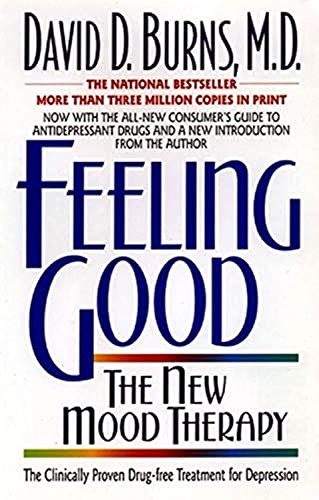Feeling Good
Overcome Depression and Anxiety with Proven Techniques
David D. Burns
BOOK REVIEW

In an age where mental health awareness is finally gaining the spotlight it deserves, Feeling Good: Overcome Depression and Anxiety with Proven Techniques by David D. Burns emerges as a beacon of hope. This captivating work is not just a guide; it's a powerful, life-altering manifesto for anyone grappling with the shadows of depression and anxiety. Spanning over 700 pages, Burns distills a wealth of information into practical exercises and actionable advice, making it feel as if he's sitting across from you, providing that much-needed therapy session.
David D. Burns, a prominent psychiatrist who transformed the landscape of cognitive therapy, skillfully combines clinical insight with compassionate understanding. His revolutionary approach is further highlighted by his own experiences with mental health struggles. This vulnerability shines through in his writing, inviting readers to engage deeply with the material. You're not just reading; you're embarking on a journey of self-discovery and healing. This isn't airy, abstract theory-it's raw, real, and refreshingly relatable.
The crux of Feeling Good lies in its accessibility. Burns takes the complex world of cognitive behavioral therapy (CBT) and breaks it down into bite-sized, digestible pieces. You will find techniques that are both straightforward and deceptively simple, yet they have the potential to enact profound change. Each chapter serves as a toolkit, arming you with the rebuttals needed to fight the insidious thoughts that plague the mind. This is not merely a passive experience; you are enlisted as an active participant in your recovery.
Readers have sung praises and shared some criticisms. Many laud Burns for his straightforward approach, emphasizing how it empowers individuals to take control of their mental health. Comments echo a collective sentiment: "This book changed my life." People appreciate the clarity and ease of understanding, stating that they immediately began implementing the techniques in their daily routines. However, some argue that the book can feel overly optimistic-can these techniques really work for everyone? This skepticism opens a dialogue, prompting reflection on the nuances of mental health treatment.
Burns doesn't shy away from addressing these concerns. In fact, he embraces them, encouraging readers to question what they read, fostering a sense of mental resilience. This is crucial, as mental health is not a one-size-fits-all journey. Each person's battle with depression and anxiety is unique, and Burns emphasizes this diversity throughout the text. By doing so, he cultivates a profound sense of community among readers-you're never alone in this struggle.
The historical context surrounding the publication of Feeling Good is equally compelling. Released in the late 90s, this book emerged as a part of the mental health movement that began to flourish in the decades prior. The stigma surrounding mental illness was slowly diminishing, opening doors for open conversations about mental well-being. Burns capitalized on this cultural shift, creating a resource that not only reflects the zeitgeist of its time but continues to resonate powerfully in today's world.
As you delve deeper into Feeling Good, prepare to be struck by the depth of personal insights that Burns shares. He breaks down the cognitive distortions that many face-patterns of thinking that contribute to emotional suffering-and challenges you to confront them head-on. The pivotal moment in your reading will likely be when you realize how these techniques can be woven into your life. The "feeling good" mantra becomes not just a catchphrase but a transformative principle, pushing you to envision a life brimming with joy and fulfillment.
Yet, amidst the sea of praise, there lies a sobering reminder: while Burns provides the tools, the journey is inherently personal and at times, excruciatingly difficult. Some readers express how the enormity of their struggles makes them skeptical about whether these methods can lead to meaningful change. This skepticism, however, does not overshadow the rays of hope this book ignites.
If you are battling your mental health, take this book to heart. Allow Feeling Good to be your companion in the dark. Each page is infused with the promise of a different tomorrow-a tomorrow where you can wake up feeling lighter, more at ease with yourself, and armed with the tools you need to conquer your thoughts.
It's time to confront the messages you've internalized, the barriers you've erected. Burns has gifted you a roadmap. Don't merely read; live it. You owe it to yourself to step into the light. This book isn't just a set of techniques; it's an invitation to reclaim your life, to break free from the shackles of depression and anxiety, and to genuinely feel good. 🌟
📖 Feeling Good: Overcome Depression and Anxiety with Proven Techniques
✍ by David D. Burns
🧾 706 pages
1999
#feeling #good #overcome #depression #anxiety #with #proven #techniques #david #burns #DavidDBurns